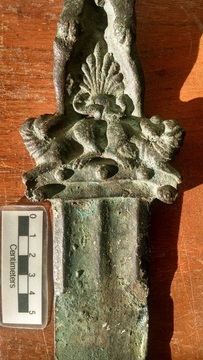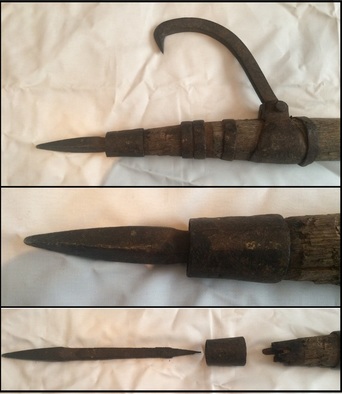 The California sword.
The California sword. I would like to see the mystery of the Fake Hercules Swords solved. Even though they're not Roman, I still find them a fascinating problem. Who started making these things? What was the "original"? How and why did they change through time? I think I find this to be an interesting challenge because historic data seem to be few and far between, requiring that we address these questions through archaeological methods and techniques: build an assemblage, try to understand and organize variability, gather information about the intrinsic characteristics of the items, construct and test hypotheses, etc. To that end, I began a Fake Hercules Sword database yesterday, and I started a group on Facebook to keep a line in the water there.
In other sword news, I will have a statement from Dr. Christa Brosseau to publish on this blog first thing Monday morning. (Update 1/25/2016: here is Brosseau's summary.) Dr. Brosseau will be able to speak publicly about her analysis after the "sword" episode of The Curse of Oak Island airs tonight in Canada. She has indicated to me that she's been following this blog and will try to respond to questions here.
 Disassembly of antique Peavey, showing the spikes that could, if you really want to be silly, be mistaken for Roman crossbow bolts (used with permission of Oak Island Compendium).
Disassembly of antique Peavey, showing the spikes that could, if you really want to be silly, be mistaken for Roman crossbow bolts (used with permission of Oak Island Compendium).
The new piece of "smoking gun" evidence for a Roman visit to Nova Scotia wasn't much of a mystery and didn't last long. The "Roman crossbow bolts" that were featured to us in the latest laundry list of nonsense turned out to be modern logging tools called Peavey points. This one was quickly cracked by Nova Scotians who understand what the remnants of their own material culture look like. Have a look at this post, this post, and this one from Oak Island Compendium. I feel pretty comfortable saying that the most plausible explanation for the "crossbow bolts" doesn't have anything to do with ancient Rome, Iberia, a 1000-year-old tree, a U.S. military testing lab, and a conspiracy to hide the truth.
Don't rewrite your history books just yet: the "crossbow bolts" are pieces of logging tools.
So much for Boltgate.
As more pieces of the "evidence" for the Roman occupation of Nova Scotia have failed to stand up to scrutiny, we've been treated to a bizarre online temper tantrum that has included some person or group of people trying to disrupt various Oak Island groups on Facebook by creating fake profiles, reporting pictures as containing nudity (when they don't), and who knows what else. In a blog post on Friday, J. Hutton Pulitzer revealed that Facebook has apparently placed him on Double Secret Probation until Monday. He adds Facebook to the growing list of conspirators (e.g., academics like me, the Catholics, the media, The History Channel, etc.) that are trying to keep the world from knowing the truth about modern Fake Hercules Swords and logging tools that have allegedly been found in Nova Scotia.
This is all very juvenile and has nothing whatsoever to do with an objective assessment of the quality of the "evidence" that's being put forward. I'm going to stay out of the nonsense as much as I can and stick to looking at the nuts and bolts (I wonder how long will it be until we are actually shown a picture of nuts and bolts and told they're Roman).
Complete insulation from the idiocy, unfortunately, may not be possible. Certainly these shenanigans are actually a part of the story: the case of #Swordgate makes it clear that battles over ideas, evidence, and opinions are multi-leveled and occurring in many different ways and places across the internet. I have neither the time nor the appetite to fight them all, and I'm not planning on getting drawn into silly playground squabbles that will make no difference to the outcome. The arguments matter, sure, but my arguments are going to be based on things that are relevant to the questions at hand.


 RSS Feed
RSS Feed
